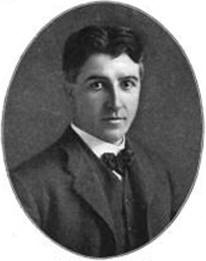GJigeJigoJigrJiggJigeJig JigCJigrJigaJigmJig Jig‚JigÄJigúJigJJigiJiggJig‚JigÄJigĚJig JigCJigoJigoJigkJig (George Cram Cook)

Author, poet, playwright, theater producer. Born to a prominent pioneer family in Davenport, Iowa, he was educated in the Davenport public schools before earning a B.A. at Harvard University then studying in Heidelberg, Germany, as well as at the Universit√© de Gen√®ve in Switzerland. Upon his return to the United States, he became a professor of English literature at the University of Iowa, teaching one of the first creative writing courses at the University and laying the foundation for the famed Writer’s Workshop. At the outbreak of the Spanish American War in 1898, he left the University to join Company B of the 50th Iowa Volunteer Infantry Regiment. After the war, he began writing, publishing a short non-fiction piece about his time in the Army, Company B of Davenport, in 1899. After marrying Susan Swain in Chicago, he accepted a professorship of English literature at Stanford University in Stanford, California in 1902. He taught for only one year before returning to Davenport, where he took up farming to support his writing. His first novel, Roderick Taliaferro, was published in 1903. It was praised by critics for the enthusiasm put into the story by Cook. He hired a young man named Floyd Dell to work at his farm, and they struck up a long lasting, though often argumentative, friendship. Dell converted Cook to Socialism, and Cook influenced Dell to become a noted novelist and newspaper man. Cook met his second wife, journalist Mollie Price, at one of the notorious parties he hosted at his farm. He became engaged to Mollie in 1907 before divorcing his first wife, Susan, who had moved out of the home two years before. Around this same time, he had met Susan Glaspell, another writer from a prominent Davenport pioneer family and his true love. Not wanting to cause a scandal, Glaspell left Davenport for New York. Cook fathered two children with Mollie before Glaspell returned to Davenport in 1910. In 1911, after his divorce from Mollie, his second novel, The Chasm, was published. It received mixed reviews, being called “pedantic” and “heavy-handed” by Francis Hackett, but garnering mild praise from Sinclair Lewis and Upton Sinclair. He married Susan Glaspell in New Jersey on April 14, 1913. They became interested in the emerging modernist trend in American theater, and while summering on Cape Cod in Massachusetts, they formed the Provincetown Players to produce their jointly written one-act play, “Suppressed Desires” in 1915. Alone and with Glaspell, Cook wrote several more plays that were performed by the Provincetown Players. Cook, as the head of the Players, produced the first plays of future Pulitzer Prize winner Eugene O’Neill after the troupe moved to Greenwich Village, New York. The troupe also served as an incubator of sorts, developing the work of actors, writers, and designers, including Edna St. Vincent Millay and Pulitzer Prize winner Paul Green. Cook took a sabbatical from the company in 1919, but returned the following year. In 1922, unhappy with the commercial aspects of the theater world and longing for a simpler life devoted to his poetry, he turned the leadership of the Players over to his protege, Eugene O’Neill, and moved to Delphi, Greece. He lived among the shepherds and spent his days writing poems and enjoying the mountain scenery. In December of 1923, he developed what he at first thought was a cold. A local doctor diagnosed him with the grippe, and Cook turned his attentions to his pet dog, who was also sick. When his wife Susan returned to Greece from Paris in early January, she found both husband and dog too weak to move. An American doctor diagnosed Cook with the equine disease glanders, speculating that the dog had contracted the disease and infected Cook with a playful nip or scratch. After his death, Cook was buried in the cemetery just outside the Temple Complex at Delphi. A group of local poets petitioned the government for a piece of marble from the Temple to mark his grave. A book of his poetry, Greek Coins, and a play, “The Athenian Women”, were published posthumously at the request of his widow, Susan Glaspell. (bio by: Dustin Oliver) ¬†Family links: ¬†Parents: ¬†Edward Everett Cook (1843 – 1914) ¬†Ellen Katherine Dodge Cook (1846 – 1918) ¬†Spouses: ¬†Sara Herndon Swain Wilson (1880 – 1958) ¬†Mollie Anastasia Price Rapp (1885 – 1929) ¬†Susan Glaspell (1876 – 1948) ¬†Children: ¬†Nilla Cram Cook (1908 – 1982)* ¬†Harlan Edward Cook (1910 – 1959)* ¬†Sibling: ¬†Reuel Bridge Cook (1869 – 1946)* ¬†George Cram Cook (1873 – 1924) *Calculated relationship Inscription:I hear the mountain streamPouring in beauty. That rhythmic waterDoes not need to be more than iselfBut ISpiritHave no reason for livingUnless somehow for spirit somewhereLife is immortal
Born
- October, 07, 1873
- USA
Died
- January, 01, 1924
- Greece
Cemetery
- Nekrotafio Agiou Ilia
- Greece

